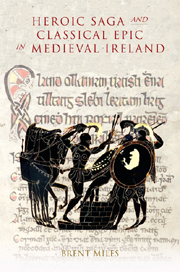Book contents
- Frontmatter
- Contents
- Acknowledgements
- Note on Texts and Editions
- Abbreviations
- Introduction: Figmenta Poetica and Heroic Saga
- 1 Classical Learning in Medieval Ireland: The State of the Question
- 2 The Irish Classical Tales: Texts and Sources
- 3 Classicism and Togail Troí
- 4 Táin Bó Cúailnge and Latin Epic
- 5 The Rhetorical Set Piece and the Breslech of the Plain of Murthemne
- Afterword: An Invitation to Study
- Bibliography
- Index
- STUDIES IN CELTIC HISTORY
1 - Classical Learning in Medieval Ireland: The State of the Question
Published online by Cambridge University Press: 12 September 2012
- Frontmatter
- Contents
- Acknowledgements
- Note on Texts and Editions
- Abbreviations
- Introduction: Figmenta Poetica and Heroic Saga
- 1 Classical Learning in Medieval Ireland: The State of the Question
- 2 The Irish Classical Tales: Texts and Sources
- 3 Classicism and Togail Troí
- 4 Táin Bó Cúailnge and Latin Epic
- 5 The Rhetorical Set Piece and the Breslech of the Plain of Murthemne
- Afterword: An Invitation to Study
- Bibliography
- Index
- STUDIES IN CELTIC HISTORY
Summary
Irish Latinity and Classical Learning
Because the aim of the present study is to examine classical studies in medieval Ireland, we would like, ideally, to distinguish between the Latin and Greek learning of Christian Ireland on the one hand, and the survival of specifically ‘classical’ or pagan learning on the other. In practice, this separation can be only imperfectly observed. Our records of the Christian conversion contain no explicit account of the origins of Latin literacy in Ireland. We are constrained to view the eventual vitality of Latin learning in Ireland as the fruit of one indivisible movement. In so far as the Latin grammarians read in Insular schools cited pagan authors, and in so far as favourite Christian poets such as Caelius Sedulius wrote in Virgilian hexameters, any notion of a division between pagan and Christian Latinity might have seemed forced to the Irish. James Carney may have had such an indivisible tradition in mind when he traced the ‘form and technique of Irish prose saga’ to the ‘mixed Christian classical culture of the early monastic period’, rather than to a specific secular tradition on the island. A distinction between ecclesiastical and secular can be observed practically only in regards to content, the scheme adopted by Michael Herren in an invaluable survey of the field.
In addition to an impractical distinction between ecclesiastical and secular learning, there are two distinct periods in time to consider. Hiberno-Latin studies has tended to concentrate on the distinctive character of the Latin of early Irish schools and Irish peregrini on the continent, roughly up to the Carolingian reforms of the ninth century.
- Type
- Chapter
- Information
- Heroic Saga and Classical Epic in Medieval Ireland , pp. 15 - 50Publisher: Boydell & BrewerPrint publication year: 2011



